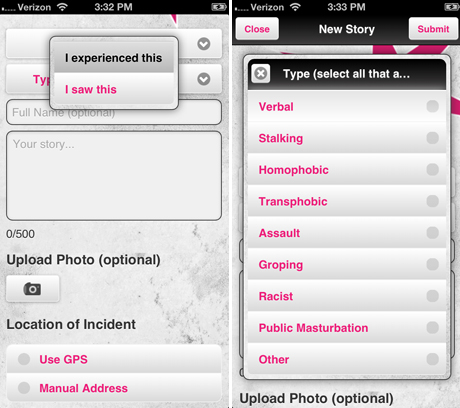 Building on a recommendation from the SSH Book to document where street harassment is happening to better be able to address it, Hollaback! has teamed up with the New York City Council to launch the Hollaback! app.
Building on a recommendation from the SSH Book to document where street harassment is happening to better be able to address it, Hollaback! has teamed up with the New York City Council to launch the Hollaback! app.
“The new app allows victims or witnesses to upload, in real time, information about where they experienced harassment on the street. It creates a map of pinned locations where harassment occurs, providing near-instant feedback to the city council’s and mayor’s offices. The app collects demographic data, too, to help officials better understand the details of where harassment occurs and who it happens to.”
This easier way to report incidents to Hollaback’s database and the option to report it to city council members has the potential to make a difference in how street harassment is documented and understood. It’s great that the app isn’t just for tracking gender-based street harassment, but also forms like racial harassment. It also lets you report harassment you witness, not just what you experience.
However, it’s important to note that often the people who are most vulnerable to harassment may not have access to a phone with an app (such as young teenagers, homeless people, poor people) so they will still have a harder time reporting incidents.
And, city council speaker and mayoral candidate Christine Quinn is the main backer of the app, yet she favors a form of street harassment: Stop and Frisk (which, as of last week, is now unconstitutional).
“Mariame Kaba (@PrisonCulture), founder of Project NIA, an advocacy organization that supports youth in trouble with the law, argued in a series of tweets that it’s “not as simple as throwing around slogans about ‘keeping women safe.”
“Which women?” she asked. “What do you mean by ‘safe?; HOW are you proposing to create that safety? ALL of these questions are gendered, racialized + age-specific, geographically-specific, etc… It isn’t neat and it isn’t simple.”
Street harassment is complex and there are no easy answers for how to deal with it… in fact there will never be just one answer because it impacts so many groups of people in various communities differently.
I do see it as promising that city council members want to address this issue, and I hope they will listen to the concerns of people like Kaba so they can improve their efforts and make them more inclusive and effective. It will be interesting to see how the app is used and what impact it may or may not have on stopping street harassment.
